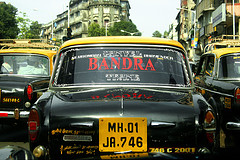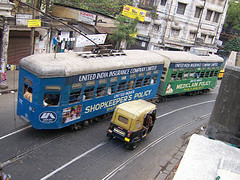5. Paco should have taken a taxi
In this section we are going to study shall and should. The main uses of shall and should are 'offer' and 'advice' respectively. But there are others.
 |
 |
 |
| By Sabamonin C. Commons. |
guy_incognito. C. Commons. | By vm2827 C. Commons. |
But after such a busy day, Paco learnt a lesson: cabs, buses and cable trains can also be useful to travel around the city. So the following day he left the hotel with the intention of getting on a bus when somebody approached him:
"Hello, sir, do you need a cab?",
Paco: "Well, I'm not sure if I'm going to take a taxi or a bus ...",
Taxi driver: "Come with me, sir, I'll take you wherever you like for 20$"
Paco: "You look too young. Do you really know the city?"
Taxi driver: "Sure I do. Shall I show you the city then, sir? Shall we say I take you for 30$ then?"
Paco: "I'm sorry but you've just told me for 20$. Otherwise ..."
Taxi driver: "OK. sir, I'll take you for that. Let's go"
It was a lovely way to visit Kolkata. The city and its atmosphere were amazing.
|
Shall |
Shall I help you with your homework?
Shall we say I take it for 20€ then? Shall I prepare the meal now or will you? |
Offer
Suggestion Asking what to do |
|
|
If you want to pass you should study more.
I think we should start revising everything again. According to the weather forecast, it should rain tomorrow. Your father should give up smoking soon. |
Saying what’s right or correct
Recommending action Uncertain prediction Advice |
1) Shall I give you a hand with the dinner?
2) You should take a taxi to go home. It's too late.
3) The company managers should find a solution as soon as possible.
4) Shall we say we sell our house to him?
5) According to this timetable the English teacher should arrive in a couple of minutes.
Say which uses of the following are in these sentences: advice, suggestion, offer, saying what's correct, uncertain prediction.
|
a) You shouldn't eat so much fat.
| |
|
b) You mustn't eat so much fat.
|
|
a) You could stay at home. | |
|
b) You should stay at home.
|
|
a) You should look for it again.
| |
|
b) You can look for it again.
|
Indian national sport
India's official national sport is field hockey, administered by the Indian Hockey Federation. The Indian field hockey team won the 1975 Men's Hockey World Cup and 8 gold, 1 silver and 2 bronze medals at the Olympic games.
However, cricket is the most popular sport. The India national cricket team won the 1983 Cricket World Cup and the 2007 ICC World Twenty20, and shared the 2002 ICC Champions Trophy with Sri Lanka. Cricket in India is administered by the Board of Control for Cricket in India, and domestic competitions include the Ranji Trophy, the Duleep Trophy, the Deodhar Trophy, the Irani Trophy and the Challenger Series. In addition Indian cricket league and Indian premier league organise Twenty20 competitions.
 |
|
| By Pablisher007. Public domain. | By Chandrachoodan. GNU license. |
Tennis has become increasingly popular, owing to the victories of the India Davis Cup team.
Association football is also a popular sport in northeast India, West Bengal, Goa and Kerala. The Indian national football team has won the South Asian Football Federation Cup several times.
Chess, commonly held to have been originated in India, is also gaining popularity with the rise in the number of Indian Grandmasters.
Traditional sports include kabaddi, kho kho, and gilli-danda, which are played nationwide. India is also home to the ancient martial arts, Kalarippayattu and Varma Kalai.
The Rajiv Gandhi Khel Ratna and the Arjuna Award are India's highest awards for achievements in sports, while the Dronacharya Award is awarded for excellence in coaching.
India hosted or co-hosted the 1951 and the 1982 Asian Games, the 1987 and 1996 Cricket World Cup. It is also scheduled to host the 2010 Commonwealth Games and the 2011 Cricket World Cup.
Adapted from Wikipedia.
Click here to learn about the formation of the verb shall in affirmative, negative and affirmative.
Click here to learn about the formation of the verb should in affirmative, negative and affirmative.
Before finishing this topic, we are going to go through the modal verbs will and would. You are already familiar to them, above all with the future form of will and the conditional one of would. You will also learn about three new vowel sounds.
